- Home
- Mordecai Richler
St. Urbain's Horseman Page 9
St. Urbain's Horseman Read online
Page 9
Amen.”
The slap of slippered feet wakened Jake. It was Mrs. Hersh.
“Does Nancy know you send money every month to a woman in Israel?”
“Maw, if I thought you were going through my mail, I’d hit the roof. I really would.”
“The letter was lying on the floor. I picked it up. Is the child yours?”
“I already have a kaddish. Haven’t you enough grandchildren?”
“That’s no answer.”
“All right then, no, it’s not mine.”
“So why does she send photographs?”
“Everybody wants to be cast in a Jacob Hersh production.”
“The way people live today, I don’t understand. I just don’t understand.”
“Once,” Jake said, “my father talked to me about careers I might take up. He advised me not to become a doctor because I’d be at everybody’s beck and call. Even in the middle of the night. Dentistry, he said, would involve me in expensive equipment. Become a rabbi, he said, and you don’t need to make any capital outlay. All you need is what I already had, a big mouth. Do you think I would have made a good rabbi?”
“You could have been anything you set your mind to.”
“With a house in the higher reaches of Outremont and a good Jewish girl for a wife.”
“I’ve never said a word against Nancy.”
“And it’s best that you never do,” he said, “because I love her. And so long as she loves me, I cannot be entirely bad.”
Watching him stagger off to the glass-topped table, seeking his bottle, she thought, why, oh my God, why did he ever leave Montreal, the fool? In those years, after the war, who wouldn’t have given his right arm for a Canadian passport? What Jew wasn’t on his knees to be let into such a good country?
“Here it is,” Jake said, rocking with the book in one hand and his glass in the other. He read aloud. “ ‘When I survey my past life, I discover nothing but a barren waste of time, with some disorders of the body and disturbances of the mind very near to madness, which I hope He that made me will suffer to extenuate many faults and exercise many deficiencies.’ ” Capping the book shut, he announced, “From the diary of the late, great Reb Shmul Johnson. Easter Eve. 1777.”
TWO
1
HOW IT MADDENED JAKE WHEN HE REMEMBERED, standing in the dock at the Old Bailey, that his abortive trip to New York years ago, the true beginning, albeit inadvertent, of what was to become his ride to ruin with St. Urbain’s Horseman, was, looked at baldly, no more than an immigration officer’s clerical error.
1951 it was and Jake, who had been studying at McGill for three years, had decided not to register for the autumn term, beginning tomorrow. New York, New York, was his heart’s desire. If only, he thought, lying on his bed, smoking, I can raise the fare. And money to keep me for a month.
His mother entered his room without knocking. “You should tell your father what you’ve decided to do. He’s so bloated. I saw him on the street, he looks like a frog now. I wouldn’t say a word against him, after all, he’s your father, you hear? Where are you going suddenly?”
Compulsively, without design, he drifted all the way down to St. Urbain Street, entering Tansky’s Cigar & Soda to phone his father, who had lived in a room nearby, ever since his parents had finally divorced four years earlier. Mr. Hersh came to fetch him in his battered Chevy, the back seat, as ever, buried in samples. Stationery supplies, ballpoint pens, calendars, blotters. Another inclement Montreal winter had eaten into the body work since Jake had last seen him. The car was rusty and rotting. “How are you, Daddy?”
Issy Hersh looked at his son and groaned. “Oy veh.”
Jake wore a blue beret. He had grown a scraggly beard and favored an elongated ivory cigarette holder. He suggested they drive to a delicatessen on the Main, as in the old days.
“But nobody goes there any more. It’s not the style.”
Reluctantly, Issy Hersh drove Jake to Hy’s Delicatessen on the Main. Smoked briskets were stacked like loaves in the window, red grizzly beef tongues heaped alongside. Salamis rocked on a line when Jake banged the door shut behind him. The aroma was even more maddeningly appetizing than he had remembered.
“It’s very simpático, this,” Jake said warmly.
“Come again.”
“It’s nice.”
“It’s a delicatessen. Big deal.”
“No. I mean just the two of us, going out to eat again.”
“I haven’t got any money, if that’s what you’re after.” Mr. Hersh ordered for both of them. Two lean on rye each, sour tomatoes, and knishes – if they were today’s. “What sort of camel shit is that you’re smoking?” he demanded, irritated.
“Gauloises.”
“Feh.”
“Do you still read Northern Miner?”
“Yes, I still read it. So?”
“What about your stocks, then?”
“What about my stocks? Right off the bat. What about my stocks? The stocks are not so hot. I don’t understand it, I really don’t. Your uncles have such luck on the market, but with me it never works. If people give me tips, it’s out of spite. I’ve lost maybe eighteen hundred smackeroos, eighteen hundred, in the last year.”
“That’s terrible. I’m sorry.”
“C’est la guerre.” Mr. Hersh motioned Jake closer. Narrowing his big frightened eyes, he searched out the farthest corners of the delicatessen for eavesdroppers. “I’ve got one stock” – his voice fell to an all but inaudible mumble – “Algonquin Mines –”
“Al-what mines?”
“Don’t say it, big mouth.”
“Say what? I didn’t even hear you.”
“You have to know the name of the mine? If you don’t, your heart will stop ticking over?”
“No. Of course not.”
“I’ve got an ock-stay – X-mines,” he said, his voice gathering volume and booming like a bowling ball across the delicatessen, “it’s just gone from a dollar nineteen to five ten … IN THE LAST WEEK …”
Immediately Hy switched off his automatic meat slicer. At the next table, an old man’s spoon clattered in a bowl of kreplach soup.
“The trouble is,” Mr. Hersh said, his voice shriveling again, “I bought it at eleven fifty-five.”
As a boy, Jake remembered, he had used to lie in wait for his father with his grammar text, terrorizing him by demanding help with his homework. Each time his father flubbed a word, Mrs. Hersh laughed, her manner exultant. If not for Rifka and him, Jake realized, they could have been divorced years ago. Issy Hersh needn’t have waited. Impulsively, Jake reached across the table to stroke his father’s cheek.
Had anybody seen? Mr. Hersh, his eyes shooting in all directions, hastily knocked Jake’s hand away. “What’s that,” he asked, “something you learned at McGill?”
Jake lit another Gauloise.
“Everything’s on me,” his father added hastily. “Today it’s Daddy who pays.”
“We should get together more often. I like you.”
“I’m your father, for Chrissake. What should you – hate me?”
“When I was a kid, you had a gift for making me laugh. Once you made me lead soldiers on the kitchen stove. You bought the molds from a junk yard, remember?”
“Well, you’re no longer a kid,” Mr. Hersh said, bewildered, “and let’s face it, it’s turned out you’re not such a fart smeller. Smart feller, I mean.”
But he didn’t earn a laugh, not even a smile.
“All right! That’s just about enough out of you. Now what did you want to talk to me about? You haven’t got the syph or anything like that?”
“No. You don’t have to worry about fees any more. I’ve quit McGill. I’m not going back.”
“Why?”
“It no longer suits my Weltanschauung.”
Mr. Hersh slapped his cheek. He rocked his head. “Boy, did you ever turn out a putz. You’re what-in-shtunk?”
“I’m bored,” Jak
e said hotly. “I didn’t like it there.”
“What did you ever like? Everything you criticize.”
“The movies.”
“What?”
“I want to get into the movies.”
Genuinely amused now, Issy Hersh shook with laughter. “Well, your ears are no bigger than Clark Gable’s. That’s a start, isn’t it?”
Jake laughed too.
“Listen here,” Mr. Hersh said, leaning closer, “you don’t just decide I-want-to-be-in-the-movies. You have to be discovered.”
“I don’t want to act. I want to direct.”
“You think I like selling. I’d rather own the factory.”
“I thought I’d go to New York for a start and look around. It’s time I found out who I am.”
“What do you mean, who you are? You’re Yankel Hersh. You want to bet on it, I’ll give you odds.”
“The trouble is, I haven’t even got the fare.”
“I knew we’d get down to brass tacks sooner or later. The yet.”
Mr. Hersh paid on the way out, scooping up a handful of change. Outside, he screwed up his eyes to glare at each coin before he dropped it into his pocket.
“Anything wrong?” Jake asked.
“Ssh. One minute.”
A couple passed. Then a hawkish old lady hugging a parcel of fish, followed by some teenagers sporting shimmering A.Z.A. windbreakers. Finally, they were alone.
“You see this,” Mr. Hersh said.
“Yes.”
“It’s an American nickel.”
“So?”
“So? What were you, born stupid? If this nickel was not a Jefferson but a 1938 Buffalo, with a tiny S and a D … S for San Francisco, D for Denver … it would be worth plenty. Only last summer, Max Kravitz picks up a drunk in his taxi and he drives him to Aldo’s. The fare is two ten. The goy hands Max a four-dollar bill. Yes, a four-dollar bill. A Bank of Upper Canada note, dated December 1, 1846. You know what that’s worth?”
“Oh, Daddy, give up,” Jake said fondly. “You’re never going to be rich.”
“In your books, that’s everything, being rich. I’d be your pal then, wouldn’t I? We could sit together in a swell restaurant, they have kosher Chinese food now in Snowdon, and you wouldn’t be ashamed if your highbrow friends spotted us. Well let me tell you this much, not that you’ll listen. What do I know, I’m just your father. Making money isn’t everything. The president of the largest steel company in the world, Charles Schwab,” he said, numbering him off on a finger, “died a bankrupt and lived on borrowed money for five years before his death. The man who in 1923 was president of the New York Stock Exchange, Richard Whitney, is still in Sing Sing. The greatest bear in Wall Street, Jesse Livemore, died a suicide. You know what you need? You need a job. Self-respect. Here,” he hollered, ramming two ten-dollar bills into his chest, “you know what I am? Crazy.”
“One day you’ll be proud of me. I’m going to be a great film director.”
“Don’t shoot me the crap,” he protested, appalled. “You want me to be proud? Earn a living. Stand on your own two feet.”
Rather than drive back with his father, Jake wandered down St. Urbain again, as far as his old school.
Fletcher’s Field High, wherefrom, three years after the war’s end, he had graduated into McGill.
There’s nothing, Jake’s mother drilled into him, like a university education.
Yes.
It’s not what you know, Jake’s father corrected her, it’s who you know.
Yes again.
Jake cultivated a New Statesman outlook, he wore a tweed jacket with leather armpatches, crammed his shelves with Penguins, and let his hair grow long. Whenever he could afford it, he ate at Italian restaurants. On each table there was an empty Chianti bottle plugged with a colored candlestick. Jake recommended Angelo’s Trattoria to an old school friend, Duddy Kravitz. “They serve the most exciting scampi,” he said.
Jake’s older sister was embarrassed by him and his irreverent friends. Suspicious, hostile, Rifka began to ask what seemed like absurd questions.
“Do you drink sherry?”
“Well, sometimes. Tio Pepe.”
He was, at the time, reading The Quest for Corvo.
“Ah ha. And what do you and your longhair friends do until four o’clock in the morning? Read poetry aloud to each other maybe?”
“Sometimes. Or we listen to records.”
“Classical?”
“Well, yeah. So?”
“Tell me, are you scared of snakes?”
“What?”
Finally Jake discovered what was behind the inquiry. An issue of Esquire on his sister’s dressing table with an article titled, “Is Your Kid Brother a Homosexual?” His future brother-in-law had given Rifka the magazine. Herky had already suggested that Jake do something about his blackheads. Before the wedding. “It’s going to be a formal affair, you know. And you’re the best man.”
“I won’t pop any during the ceremony, O.K.?”
Jake took to walking about the house with his hands held in front of him, the wrists limp. At the supper table, he said to Herky, “Be a dear, will you, and pass me another knish. Merci.”
“Easy there,” Herky said.
Money.
“It’s for New York, Uncle Sam. Until I get settled there. I need two hundred and fifty dollars.”
“Money. Ach, you’ve got your health, it’s worth a million. I envy you to be your age.”
“I could pay it back within a year.”
“Look at us. You’re an intelligent boy. We sit here … friends, family … You want another rye and ginger ale? Take. Who’s counting? It’s open house here. Isn’t that so? Then I lend you money and you tell me I can have it back within a year. Right?”
“You’ve got my word.”
“Then God forbid a year goes by and you haven’t got the money. Then what happens? Tensions. Bad feeling. We no longer sit together, my rye and ginger ale between us –”
“But I promise, Uncle Sam –”
“You promise? Who comes to borrow money and says I won’t pay you back? It’s not my policy to lend. It only makes enemies. Specially family. You see my point of view?”
The sign behind the desk in Uncle Jack’s office read:
ALI BABA WAS A FORTUNATE MAN, INDEED
– He Only Had 40 Thieves To Deal With
Uncle Jack said no, he couldn’t lend money, not at the moment. So Jake tried Uncle Lou.
“I’ll come right to the point. I need two hundred and fifty dollars.”
“That’s some stench of humor you’ve developed.”
“This is serious, Uncle Lou. I’ve knocked up a shiksa.”
“Oh my God, I could tell you were in trouble. Just looking at you I said to myself, the kid’s in hot water, a tankful. I’ve always liked you.”
“Either I raise the money for an abortion or I’ve got to marry her.”
“Two hundred and fifty dollars?”
“That’s the size of it.”
“Don’t brag.”
“What?”
“A joke. I try to see the humorous side of everything. It’s my philosophy.”
“Oh, I see.”
“Listen, my Ida’s brother-in-law, the doctor in Hamilton, you remember him I’m sure. He’ll do it for you, it will cost you only two hundred tops.”
“I’d hate to have to bargain about a thing like this. It’s not my nature, Uncle Lou.”
“I understand. I’m the same. I’ll phone him myself and settle it for you.”
“Could you let me have the two hundred then?”
“There’s no need. He’s in to me for more than that. I’ll wipe it off his account.”
Only Uncle Abe was left, scornful Abe, the apogee of Hersh achievement; the guiding intelligence of Hersh, Seligman, Conway, Bouchard & Wiser, Advocates-Avocats. With offices in the Dominion Square Building and a stone mansion in Outremont. Not, Jake had to allow, utterly without conscience,
for during the war he had championed the cause of the orthodox Jewish refugees, arguing for their legal rights, raising funds, finding them homes and jobs. But with a daughter Jake abhorred, the insufferable Doris, and a late-born son Uncle Abe devoured with love. Scornful Abe would bounce his six-year-old Irwin on his lap, and, inviting Jake to admire him, ask the boy to name Canada’s nine provinces, drenching him in kisses once he had responded correctly. “This kid, I tell you, this is some kid.” No, he had no intention of asking Abe for money.
Herky? Mn, maybe. Worth a try. Jake phoned him and asked if they could meet for a drink. Can do, Herky said, and he drove him to a roadhouse.
Jake and Herky did not go directly to their table. Hooking him under the arm, Herky said, “Got to check out the cans first. Come on.”
Herky manufactured liquid soap and towel dispensers and deodorizing solutions for urinals. He never went to a restaurant or nightclub or a hotel without first inspecting the toilets and reporting back in full to the table. “It’s from the Stone Ages here. You know what they’ve got in the urinals? Ice cubes.” The roadhouse was not one of Herky’s clients. “This isn’t a toilet, it’s a storage tank for last week’s farts. Take a deep breath, kid.”
“I believe you.”
“It’s a shame, a crying shame. You know why, but? In their books, the toilets are nonproductive units. They don’t turn over a profit. But that’s short-sighted as all hell, because if a guy comes in here to comb out his hair and gets a whiff of last week’s crap, he doesn’t complain about the toilet, that would be undignified, he tells everyone the steak isn’t juicy. You read me?”

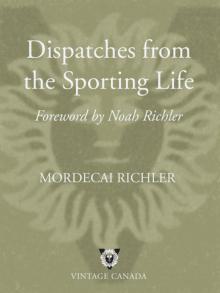 Dispatches From the Sporting Life
Dispatches From the Sporting Life The Acrobats
The Acrobats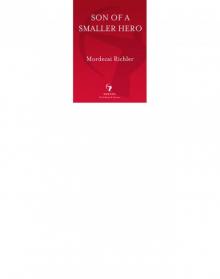 Son of a Smaller Hero
Son of a Smaller Hero Jacob Two-Two-'S First Spy Case
Jacob Two-Two-'S First Spy Case Jacob Two-Two Meets the Hooded Fang
Jacob Two-Two Meets the Hooded Fang Jacob Two-Two and the Dinosaur
Jacob Two-Two and the Dinosaur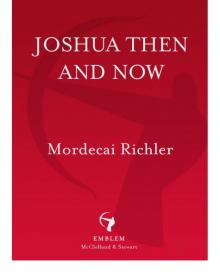 Joshua Then and Now
Joshua Then and Now Solomon Gursky Was Here
Solomon Gursky Was Here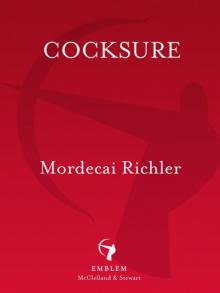 Cocksure
Cocksure The Street
The Street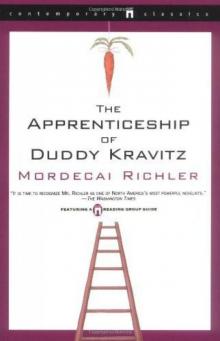 The Apprenticeship of Duddy Kravitz
The Apprenticeship of Duddy Kravitz A Choice of Enemies
A Choice of Enemies Barney's Version (Movie Tie-In Edition)
Barney's Version (Movie Tie-In Edition)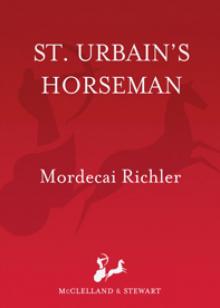 St. Urbain's Horseman
St. Urbain's Horseman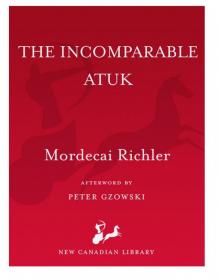 The Incomparable Atuk
The Incomparable Atuk Barney's Version
Barney's Version